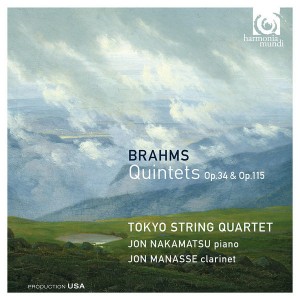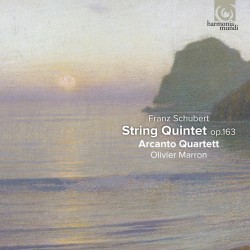Classical CD Reviews: Three of the Nineteenth Century’s Greatest Quintets
Chamber music fans will know that the current season will be the last for the extraordinary Tokyo String Quartet (TSQ), which opted to disband rather than replace retiring violinist Kikuei Ikada and violist Kazuhide Isomura.
Brahms Quintets Op. 34 & Op. 115 by Brahms. Performed by Tokyo String Quartet (Jon Nakamatsu and Jon Manasse), Harmonia Mundi, 2012.
Franz Schubert String Quintet op. 163 by Schubert. Performed by the Arcanto Quartett and Olivier Marron, Harmonia Mundi, 2012.
By Jonathan Blumhofer
Three of the nineteenth century’s greatest quintets are the focus of two fine, new recordings on the Harmonia Mundi label. On the first, Brahms’s autumnal Clarinet Quintet is paired with his early Piano Quintet on an album featuring the Tokyo String Quartet joined, respectively, by clarinetist Jon Manasse and pianist Jon Nakamatsu. The second features Schubert’s valedictory String Quintet with the Arcanto Quartett and guest cellist Olivier Marron.
Chamber music fans will know that the current season will be the last for the extraordinary Tokyo String Quartet (TSQ), which opted to disband rather than replace retiring violinist Kikuei Ikada and violist Kazuhide Isomura. Whether or not premonitions of the group’s impending end can be read into their performances on this all-Brahms disc, one can’t help but feel the ensemble’s deep familiarity with and love for this music: their decades of playing together shines through every track.
This is especially true of the performance of the Clarinet Quintet, which possesses a powerfully melancholy restraint. It isn’t exactly a sad piece, but it is one that’s filled with the wisdom of experience; it’s the score one might find next to the dictionary definition of the word “bittersweet.”
And so is this performance. The TSQ has recorded the Clarinet Quintet three times now (most recently with Richard Stoltzman), and their playing here is warm throughout, often glowing and occasionally fanning into a crackling flame. Tempos are appropriately relaxed but never slow—this performance feels a bit more expansive than the ensemble’s earlier effort, but it actually clocks in slightly faster. Go figure. Mr. Manasse’s liquid tone bubbles with great charm in the perky third movement and soars in the famous Adagio.
In the Piano Quintet, the TSQ, joined by Mr. Nakamatsu, give an appropriately fiery performance of this early masterpiece. The slow movement unfolds with serene pacing and beauty, while the mighty, outer movements are packed with energy and the Scherzo features a kind of grim humor, all of which is profoundly satisfying.
There is certainly no shortage of recordings of any of these pieces, but the TSQ has more than earned the right to make one last pass through the Brahms quintets. What is there to make, then, of another recording of the Schubert String Quintet? Quite a bit, actually. The Arcanto Quartett has been around for a decade now and is made up of four of Europe’s finest instrumentalists, all of whom play lots of contemporary music. As a result, they tend to tackle the standard repertoire with gusto and insight gleaned from working alongside living composers. And it shows here.
This is a performance that’s taut, energetic, and muscular. There’s a briskness to some of their tempos (the ethereal second movement clocks in nearly 90 seconds shorter than the Borodin Quartet’s 1993 recording), but nothing feels rushed. That and textural clarity is clearly balanced in even the most contrapuntal sections. Mr. Marron’s account of the first cello part might not top Mstislav Rostropovich’s poetic account with the Emersons (available on Deutsche Gramophone), but he comes close to equaling it. All in all, it’s a terrific deal (even if it might have been nice to include a little bit of filler on a 52-minute disc).
Jonathan Blumhofer is a composer and violist who has been active in the greater Boston area since 2004. His music has received numerous awards and been performed by various ensembles, including the American Composers Orchestra, Kiev Philharmonic, Camerata Chicago, Xanthos Ensemble, and Juventas New Music Group. Since receiving his doctorate from Boston University in 2010, Jon has taught at Clark University, Worcester Polytechnic Institute, and online for the University of Phoenix, in addition to writing music criticism for the Worcester Telegram & Gazette.


